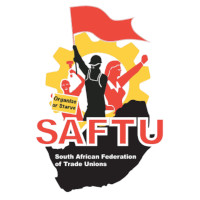SAFTU OBSERVES THE WORLD DAY FOR DECENT WORK
The South African Federation of Trade Unions (SAFTU) commemorates today, 7 October, the International Day for Decent Work. This day is important especially in the context of the attacks on working conditions and the livelihoods of workers.
Because capitalism is a system of profiteering, it has throughout history hatched ways through which it can make conditions riper to realise maximum profits. These methods include a relentless attack on the conditions of work, seeking to naturalise the casualisation of labour first to justify exploitation, and secondly to weaken the organisation of workers.
Although South Africa’s StatsSA has many weaknesses when it comes to labour, among which is that the Quarterly Labour Force Survey (QLFS) does not report on the status of workers relating to insourcing and outsourcing, or to labour broking, it is estimated that outsourced workers and workers employed through labour brokers are a major component of the workforce. This phenomenon accelerated in the late 1990s when the new government agreed to capital’s desire to outsource millions of previously insourced workers. Mining and construction companies externalised the costs of employee benefits to maximise profits. Today, many construction workers are still outsourced and precarious. They are either casualised or in fixed-term contracts.
This has contributed to the weakening of the trade unions, as the precarity of more and more workers makes them vulnerable and fearful of employers, who often victimise trade union activists. The 76% of the unorganised workers in our economy are not entirely or even disproportionately barred from the trade unions by the corruption that has plagued the labour movement, but their status is mainly due to their precarity and intimidation from employers.
In addition, the changing character of work has also contributed to precarianisation and lack of organisation. In our Central Committee in Nov-December 2021, SAFTU’s Commission on the Future of Work noted the impact of 4th Industrial Revolution technology on jobs and the ‘gig economy,’ including an emerging industry of e-hailing, piece work and zero hour contracts, constituted by multitude of workers who resembles the journeymen of the old mercantile capitalism. These workers are precarious, and because they are workers qua small traders, are susceptible to super-exploitation by e-hailing controlling companies. Making links and recruiting them into the trade union movement is of utmost importance, as we continue to elaborate new methods of organising in the context of the changing nature of work.
The changing nature of work due to robotification, higher capital intensity and technological displacement of workers, added to the precarianisation (casualisation, outsourcing, temporary work) of workers by bosses looking to minimise costs of production and maximise profits, all contribute to attacks on decent wages.
Whilst machination leads to retrenchments, corporate power leads to suppression of workers’ wages. Even in the context of positive business growth when firms record staggering profits, workers always get a negligible share of those earnings. The employers always seek to increase their profits bybeating prior records. One result in South Africa has been that 75% of the 14,9 million (11,1 million) employed workers earn below R5 800 per month. Fewer than 4% take more than 50% of all the personal income. This reality has reproduced the alarming levels of inequality in which 10% of the population owns more than 80% of the household wealth in this country.
SAFTU has launched a campaign to fight against the rising cost of living and to fight for a living wage. On 24 August 2022 we began with a broad-based strike, and now we are in a stage of protracted struggle to relentlessly fight for decent work, decent wages and improved livelihoods of workers.






